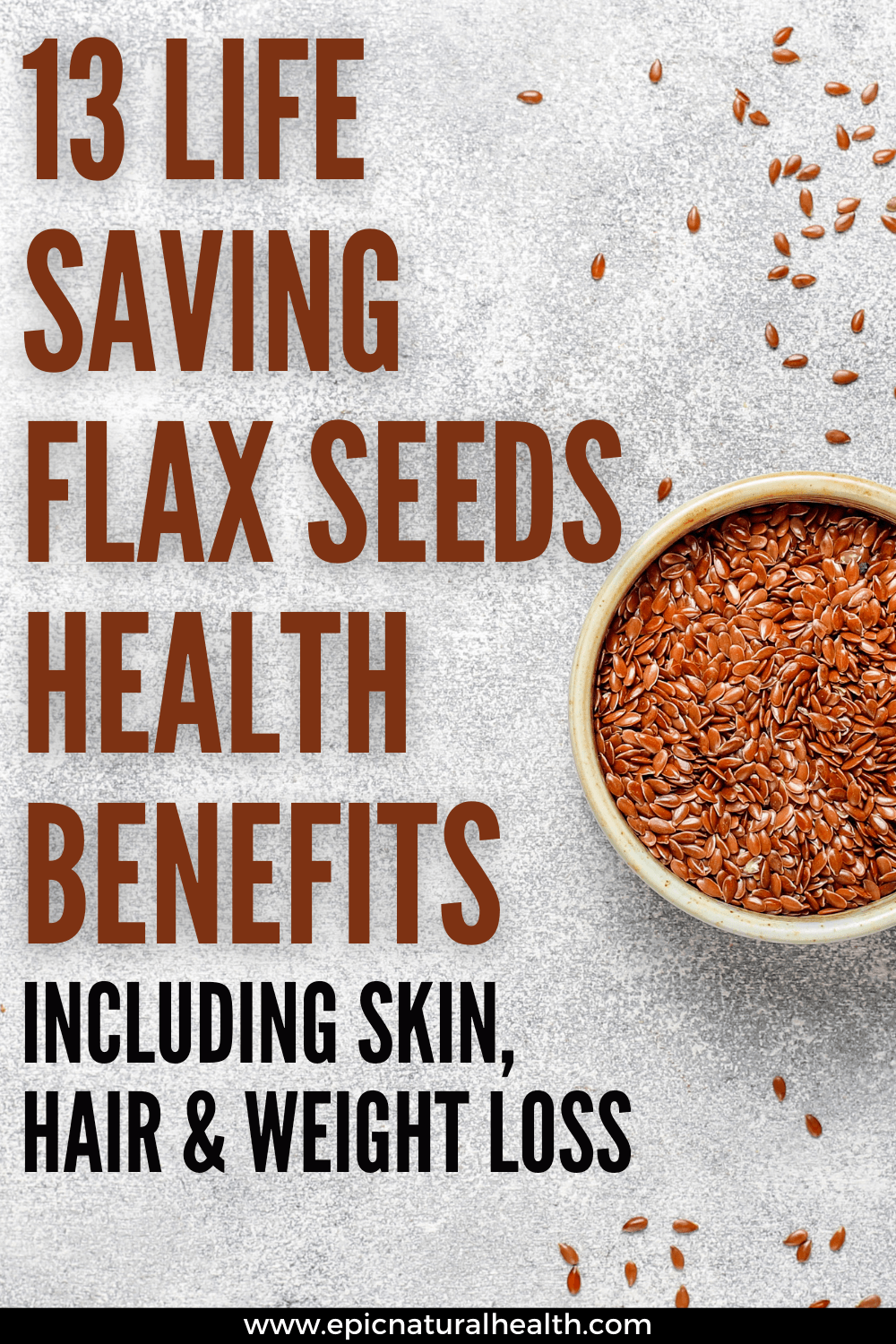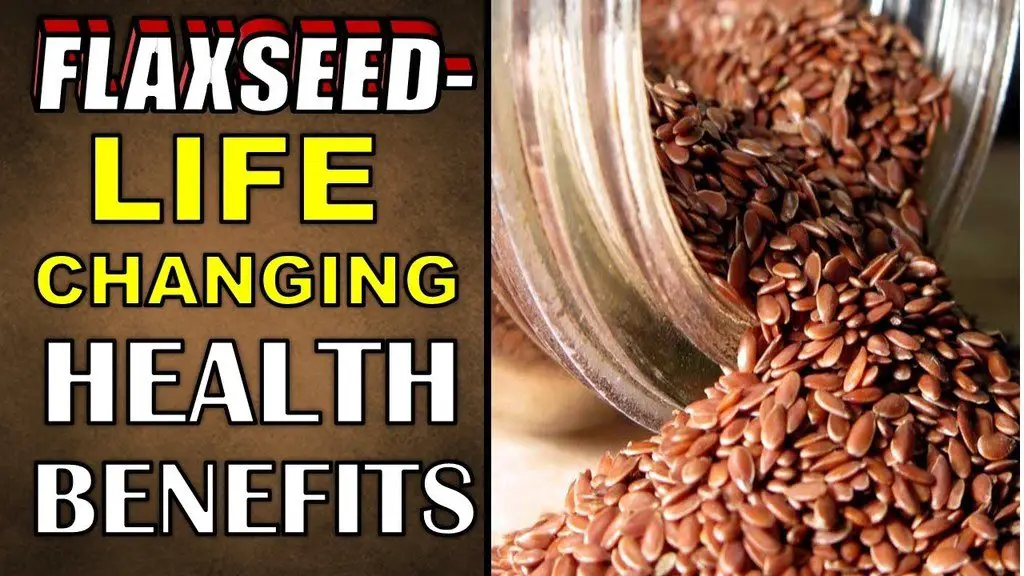Flax seeds 13 benefits
1. Improves circulation and reduces the risk of osteoporosis
Flaxseed contains a plant-based type of omega-3 fatty acid called alpha-linolenic acid, or ALA, which has been linked to improved circulation and anti-inflammatory effects. Research shows that these fats may also help fight osteoporosis, a disease characterised by the reduced density and quality of bone, by reducing the risk of bone fractures.
2. May protect against type 2 diabetes

Flax seeds are one of the best foods when it comes to controlling diabetes. They assist in the management of blood sugar levels, and together with lifestyle changes and medication as needed, they can help diabetics more easily manage their disease.
It’s thought that flaxseeds can improve insulin sensitivity. As they keep blood glucose stable, diabetics should experience fewer major spikes throughout the day. This blood sugar-lowering effect is due to flaxseeds' insoluble fibre content, which slows down the release of sugar into the blood and thus reduces blood sugar.
In one small study, scientists gave people 0 grams, 13 grams, or 26 grams of flaxseed daily for 12 weeks. The participants all had prediabetes. The people in the group who consumed 13 grams of flaxseed a day had lower blood glucose and insulin levels, and improved insulin sensitivity at the end of the study period.
3. May prevent some cancers
Flaxseed is a top source of particularly health-protective antioxidants called polyphenols. These antioxidants are thought to protect against cancer, as well as cell-damaging oxidative stress. Flax is also rich in lignans. These plant compounds are thought to have antiangiogenic properties, which means they may stop tumours from forming new blood vessels and growing.
One study of more than 6,000 women found that those who regularly ate flaxseeds were up to 18 percent less likely to develop breast cancer. Post-menopausal women seemed to benefit the most.
Other small studies suggest that flaxseeds may help lower the risk of prostate cancer in men. Evidence is conflicting, though, so more research is needed before we can confirm the benefits of flaxseed against cancer.
4. It can lower blood pressure

The good omega 3 fats in flaxseed help reduce blood pressure and prevent strokes. In fact, research suggests that thanks to their omega 3 content, flaxseeds can reduce blood pressure as effectively as lifestyle changes such as exercising more, cutting back on salt, or limiting alcohol.
At the end of one 6-month study of 110 people with hypertension, the blood pressure of those who ate 30 grams of milled flaxseed a day was lower than those who were on a placebo. The researchers concluded the blood pressure benefits from eating flaxseed could lead to 50 percent fewer strokes and 30 percent fewer heart attacks. This is incredibly promising news for anyone who is currently dealing with high blood pressure.
5. High in fibre and aids digestion

Flaxseed contains both soluble fibre and insoluble fibre. Soluble fibre helps soften stool, so it can pass through the GI tracts and be eliminated more easily.
Insoluble fibre helps stimulate the digestive system to move waste through the gut and promote bowel regularity. The two types of fibre work together to support digestive health, and we need them equally.
We don’t always get enough fibre in today’s world, where many foods are low-fibre and not so great for digestion. Simply sprinkling a tablespoon of flaxseed onto your breakfast may be enough to help keep your body regular.
6. Anti-ageing skin properties

As we age, our skin shrinks and flattens out, losing its bounce. The protein and essential fatty acids found specifically in flaxseed oil can help prevent this from happening and stop wrinkles in their tracks.
Flaxseed oil applied topically can give the skin a plumper appearance and help to repair the skin’s cells, showing a marked improvement in elasticity, firmness, tone, and texture.
Skin that has been nourished with flaxseed oil looks brighter and smoother, with fewer fine lines and wrinkles. Flaxseed beneficial for the rehydration of dry, itchy skin because the essential fatty acids prevent the skin from drying out and keep it moist. The Antioxidants found in flaxseed oil are highly concentrated; they help the skin to protect against free-radicals and UV rays.
7. May prevent neurodegenerative disease
Flaxseeds are one of the best omega-3 fatty acid sources, which is essential for brain health brain throughout life, from early cognitive development in babies to learning and memory in adults. Brain cells with high levels of omega-3 in their membranes are thought to be better at communicating with other cells, an important process for brain function.
When omega-3 is absorbed by the body, some of it is broken down into other molecules that have important roles in the brain, including protecting cells from oxidative stress. Research has indicated that the immune response and oxidative stress in the brain may contribute to the development of Alzheimer's disease.
For this reason, making sure to get your daily dose of flaxseed may prevent Alzheimer's disease in the long run.

8. May be helpful for weight loss

Flaxseed contains soluble fibre, which combines with water to form a gel-like consistency that slows the emptying of the stomach. This, according to the experts, leads to increased feelings of fullness, and prevents you from feeling hungry immediately after consuming a meal containing flax.
So if you find yourself struggling with a mid-morning energy slump, instead of giving into your sugar cravings, try adding flaxseed to your breakfast and seeing what a difference it makes.
There’s some interesting evidence behind this benefit, too. An analysis of 45 studies concluded that the consumption of flaxseed, particularly 30 grams a day, or about two tablespoons, resulted in reductions in both body weight and waist measurement.
Of course, flaxseed needs to be combined with a healthy diet and plenty of exercisesxercise, or you’re unlikely to see any difference.
9. Can treat skin conditions

Flaxseed is best known in the skincare world for its anti-inflammatory properties, which help to minimise any irritation of the skin or redness, meaning that sunburn or a skin rash can heal quicker once a small amount of this soothing oil is applied.
Flaxseed oil is also extremely beneficial for chronic skin conditions, such as rosacea, acne, dermatitis, eczema, or psoriasis. It’s thought that the healthy fatty acids found naturally in flaxseed act to balance out the skin’s own oils and reduce any inflammation, helping the skin to repair itself at a faster and more efficient rate.
10. Boosts hair health

There are a number of reasons why flaxseeds are healthy for your hair. They’re rich in vitamin E, which promotes good scalp health by reducing free radical damage.
They help improve circulation in the head, promoting hair growth and slowing down hair breakage. Additionally, they can help prevent premature greying of hair.
Flax seeds are also rich in omega-3 fatty acids, which are known to be great for the hair, as they keep it nourished and prevent drying, especially during winter. Some studies have shown that omega 3 may help prevent hair loss and thinning of hair, as well as dry scalp and even dandruff.
Flaxseeds act on both hair and scalp, thanks to the presence of nourishing nutrients like B vitamins, magnesium, manganese, selenium, and copper. These nutrients boost hair growth and help hair to grow stronger and longer.
11. May improve hot flashes
The research is mixed, but some studies suggest flaxseed can help with hot flashes, a common symptom of perimenopause. It has been theorized that flaxseed is a possible treatment for hot flashes because it’s a source of dietary lignans, which are phytoestrogens – and these are known for their ability to relieve hot flashes.
One study found that women who consumed 20 grams of crushed flaxseed twice a day, mixed into cereal, juice, or yogurt, had half as many hot flashes as they did before. The intensity of their hot flashes dropped too, by more than 50 percent.
12. Natural treatment for dry eyes

Flaxseed oil contains important dietary fatty acids that have multiple health benefits, including prevention or treatment of dry eyes. Daily supplements of flaxseed oil, when used alone or in tandem with lubricating eye drops, appears to reduce dry eye symptoms, including burning, stinging, redness, and intermittent visual disturbances.
For this reason, a number of eye doctors now are recommending flaxseed oil supplements for their patients who suffer from dry eyes.
Research also suggests these same fatty acids may reduce the risk of macular degeneration and cataracts, so flaxseed may even help to prevent your eye health from deteriorating with age.
13. Reduces high cholesterol
Of course, eating flaxseeds can't be used as a replacement for cholesterol-lowering medication for folks who need it. But several small studies have found that eating flaxseeds may help in the fight against high cholesterol.
During digestion, the soluble fibre in flaxseed helps bind cholesterol and push it out of the body, lowering cholesterol levels in the blood. It’s thought that eating 30 grams a day of flaxseed powder for three months is enough to help lower total cholesterol by 17 percent and "bad" LDL cholesterol by nearly 20 percent.
How to max out the benefits of flaxseed
Tempted to give flaxseed a go yourself? The first thing to know is that it's best to eat it after it's been crushed or preferably ground. That’s because whole flaxseed is likely to pass through your intestines undigested. In other words, the healthful fats and other nutrients won't be absorbed into your bloodstream.
There's more: Because the oils in flax are delicate, they can begin to break down when they’re exposed to air and light. So to take full advantage of their perks, you should grind the seeds up in a coffee grinder right before you eat them.

Look for golden or brown whole flaxseeds at your local grocery store, where flaxseeds are now sold amongst other superfoods, or online. If you can find sprouted flaxseed, even better. Sprouting is a process that makes the seeds more easily digestible and makes their nutrients more readily available.
It’s easy to sprinkle ground flaxseed on oatmeal, salads, or cooked veggies, and it can also be baked. Flaxseed is a great addition to muffins, cookies, brownies, and sweetbreads, like pumpkin or zucchini.
You can also add ground flaxseeds to smoothies, energy balls, and healthy pancakes, or use them as a plant-based substitute in baked goods recipes that call for egg. Simply replace each egg with one tablespoon of flaxseed and three tablespoons of water.
Conclusion
There are so many amazing health benefits of flaxseed, and adding the superfood’s light, nutty taste to your favourite foods is a great way to boost the fibre and nutrient content of your diet. Just make sure not to go over your daily recommendations – as delicious as it is, you don’t need any more than 5 tablespoons max per day.
- Ground organic flaxseed with great nutty taste
- 3 gram of dietary fiber per serving; 98 Milligrams of Lignans per serving
- Rich in Omega 3 (ALA) fatty acids
- 98 Milligrams of Lignans per serving
- SUPERFOOD SEEDS: Discover the power-packed goodness of Elan Organic Flax Seeds. These raw nutritious seeds are ready to enhance your favorite snacks and recipes
- GET CREATIVE: Add these flax seeds to smoothies, baked goods, and oatmeal for a nutritious boost
- REAL NUTRITION: A good source of iron, zinc, magnesium, fiber and omega-3 fatty acids, these raw flax seeds are an excellent choice for supporting digestion and promoting a balanced diet
- PROUDLY CERTIFIED: Proudly certified organic (USDA & Ecocert), Gluten-Free, and Kosher, ensuring high-quality standards for health-conscious snackers
- USDA Certified Organic Whole Brown Flaxseed
- Batch Tested and Verified Gluten Free
- Product of Canada, Packed in California
- Non-GMO, Vegan, Sproutable
- Seeds
- Flax Seeds
- A great way to increase your intake of Omega-3 Fatty Acids, Alpha-Linolenic Acid (ALA), and Omega-6 Fatty Acid, Linoleic Acid (LA), adding a couple tablespoons of flaxseed is also an easy (and delicious) way to increase your daily fiber.
- Low Sodium.





